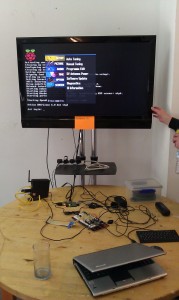My BASIC is at the stage where I’m writing lots of little (and not so little!) demos for it, and I’m having a lot of fun re-writing some of the old games and demos I wrote and used all that time back, and noticing something else… Computers now are much faster and more capable than they were 30 years ago, so why not take advantage of it…
One of the things I wrote back then was a turtle graphics interpreter for the Apple II. I wrote it in Apples Applesoft BASIC, so it was slow, even then. BASIC interpreting a simple turtle graphics language I’d developed so I could draw pretty pictures. Some would take up to 5 minutes to draw!
Now, build turtle graphics into RTB and write some programs to explot it… And I find that the pictures are not only fast, but fast enough to animate! So you draw a nice spiral, but if you draw it in a loop, changing the start angle every iteration, it spins – something that took over a minute 30 years ago can now be done 30 times a second.
So this opeens up a whole new world of possibilities – animated turtle graphics! That in itself is quite exciting, but what else can we do?
Watch this space as they say…

